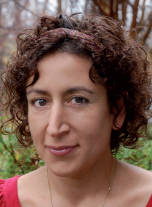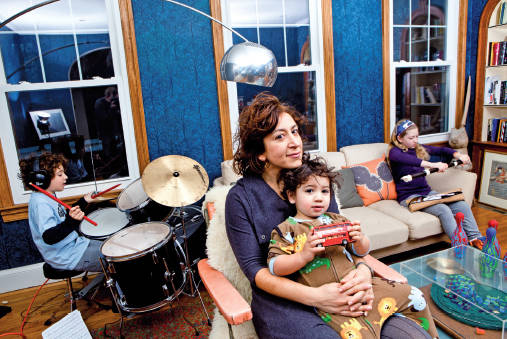Hanna Rosin, Mother Inferior?
| Hanna Rosin | Mother Inferior? |

HANNA ROSIN was born in Israel and raised in Queens, one of New York City’s five boroughs, by her taxi-driver father, about whom she wrote fondly in New York magazine. Rosin cofounded the women’s Web site DoubleX and is a senior editor at the Atlantic. In 2010, she delivered a presentation for TED, a nonprofit organization “devoted to ideas worth spreading,” on the “rise of women”—the theme of her article “The End of Men,” which appeared in the Atlantic in 2010, and a forthcoming book. She has also appeared on The Daily Show with Jon Stewart and The Colbert Report. Her book God’s Harvard: A Christian College on a Mission to Save America (2007) profiles the evangelical Patrick Henry College. The article that follows is her response to Amy Chua’s “Why Chinese Mothers Are Superior”; it appeared in the Wall Street Journal in 2011, a week after Ms. Chua’s article ran.
1The other day I was playing a game called “Kids on Stage” with my 2-year-old. I had to act out “tiger,” so I got down on all fours and roared. He laughed, so I roared even louder, which only made him laugh more. Eventually he came up to me, patted my head and said “kitty kat” with benevolent condescension. This perfectly sums up my status in the animal pack of mothers defined by Amy Chua’s Battle Hymn of the Tiger Mother. There are the fierce tigers who churn out child prodigies, and then there are the pussycats who waste their afternoons playing useless board games and get bested by their own toddlers.

2In pretty much every way, I am the weak-willed, pathetic Western parent that Ms. Chua describes. My children go on playdates and sleepovers; in fact I wish they would go on more of them. When they give me lopsided, hastily drawn birthday cards, I praise them as if they were Matisse, sometimes with tears in my eyes. (Ms. Chua threw back one quickly scribbled birthday card, saying “I reject this,” and told her daughters they could do better.) My middle son is skilled at precisely the two extracurricular activities Ms. Chua most mocks: He just got a minor part in the school play as a fisherman, and he is a master of the drums, the instrument that she claims leads directly to using drugs (I’m not sure if she is joking or not).
3I would be thrilled, of course, if my eldest child made it to Carnegie Hall at 14, which is the great crescendo of the Chua family story (although I would make sure to tell my other two children that they were fabulous in other ways!). But the chances that I would threaten to burn all her stuffed animals unless she played a piano piece perfectly, or to donate her favorite doll house to the Salvation Army piece by piece, as Ms. Chua did with her daughter, are exactly zero. It’s not merely that such vigilant attention to how my daughter spends every minute of her afternoon is time-consuming and exhausting; after all, it takes time to play “Kids on Stage” and to drive to drum lessons, too. It’s more that I don’t have it in me. I just don’t have the demented drive to pull it off.
4Many American parents will read Battle Hymn of the Tiger Mother and feel somewhat defensive and regretful. Well, I do make my Johnny practice his guitar twice a week! Or, Look, I have this nice discipline chart on my refrigerator with frowny faces for when he’s rude at dinner! But I don’t feel all that defensive. In fact, I think Ms. Chua has the diagnosis of American childhood exactly backward. What privileged American children need is not more skills and rules and math drills. They need to lighten up and roam free, to express themselves in ways not dictated by their uptight, over-invested parents. Like Ms. Chua, many American parents suffer from the delusion that, with careful enough control, a child can be made perfect. Ms. Chua does it with Suzuki piano books and insults, while many of my friends do it with organic baby food and playrooms filled with carefully curated wooden toys. In both cases, the result is the same: an excess of children who are dutiful proto-adults, always responsible and good, incapable of proper childhood rebellion.
5In the days since Ms. Chua’s book has come out, the media have brought up horror stories of child prodigies gone bad, including [ a ] 16-year-old who stabbed her mother to death1 after complaining that her Chinese immigrant parents held her to impossibly high standards. Most prodigy stories, I imagine, involve more complicated emotions. (The Amy Chua of the book, by the way, is more seductive than the distilled media version. She is remarkably self-aware. “The truth is, I’m not good at enjoying life,” she writes, and she never hesitates to tell stories that she knows make her look beastly. It’s worth noting that, in TV and radio interviews about the book, she’s been trending more pussycat).2
6I have a good friend who was raised by a Chinese-style mother, although her parents were actually German. Her mother pushed her to practice the violin for eight hours a day, and she rarely saw other people her age. Now she is my age, and she does not hate her mother or even resent her. She is grateful to her mother for instilling in her a drive and focus that she otherwise would have lacked. What she does hate is music, because it carries for her associations of loneliness and torture. She hasn’t picked up the violin in a decade, and these days, she says, classical music leaves her cold. It’s not an uncommon sentiment among prodigies: “I hate tennis,” Andre Agassi says on the first page of his autobiography, Open, “hate it with a dark and secret passion, and always have.”
7The oddest part of Ms. Chua’s parenting prescription is that it exists wholly apart from any passion or innate talent. The Chua women rarely express pure love of music; instead they express joy at having mastered it. Ms. Chua writes that she listened to CDs of Itzhak Perlman to figure out “why he sounded so good.” This conception of child prodigies is not just Chinese. It is the extreme expression of the modern egalitarian notion of genius, as described by Malcolm Gladwell in Outliers. Anyone can be a genius, if they just put in 10,000 hours of practice! It doesn’t matter if they can carry a tune or have especially limber fingers. They don’t even have to like music.
8But why not wait for your children to show some small spark of talent or interest in an activity before you force them to work at it for hours a day? What would be so bad if they followed their own interests and became an expert flutist, or a soccer star or even a master tightrope walker? What’s so special about the violin and the piano?
9Ms. Chua’s most compelling argument is that happiness comes from mastery. “What Chinese parents understand is that nothing is fun until you’re good at it.” There is some truth to this, of course. But there is no reason to believe that calling your child “lazy” or “stupid” or “worthless” is a better way to motivate her to be good than some other more gentle but persistent mode. There is a vast world between perfection and loserdom. With her own children, Ms. Chua does not just want them to be good at what they do; she wants them to be better than everyone else.
10“Children on their own never want to work,” Ms. Chua writes, but in my experience this is not at all true. Left to their own devices, many children of this generation still have giant superegos and a mad drive to succeed. They want to run faster than their siblings, be smarter than their classmates and save the world from environmental disaster. In my household, it’s a struggle to get my children to steal a cookie from the cookie jar without immediately confessing.
11Before I had children, I worried about all the wrong things. I was raised by (immigrant) parents who did not have a lot of money, and so I spent my childhood roaming the streets of Queens looking for an open handball court. My children, by contrast, have been raised by relatively well-off parents who can afford to send them to good schools and drum lessons. I wanted them to be coddled and never to experience hardship. But childhood, like life, doesn’t work that way. Privilege does not shield a child from being painfully shy or awkward around peers or generally ostracized. There are a thousand ways a child’s life can be difficult, and it’s a parent’s job to help them navigate through them.
12Because Ms. Chua really likes bullet points, I will offer some of my own:
- Success will not make you happy.
- Happiness is the great human quest.
- Children have to find happiness themselves.
- It is better to have a happy, moderately successful child than a miserable high-achiever.
13“Western parents,” Ms. Chua writes, “have to struggle with their own conflicted feelings about achievement, and try and persuade themselves that they’re not disappointed about how their kids turned out.” With that, she really has our number. At the present moment in Western parenting, we believe that our children are special and entitled, but we do not have the guts or the tools to make that reality true for them. This explains, I think, a large part of the fascination with Ms. Chua’s book.
14But Battle Hymn of the Tiger Mother will lead us down the wrong path. The answer is not to aim for more effective child-perfecting techniques; it is to give up altogether on trying to perfect our children. Now I look upon those aimless days wandering the streets of Queens with fondness, because my life since then, starting the moment I entered a competitive high school, has been one ladder rung after another.
15In her book, Ms. Chua refers, with some disdain, to her mother-in-law’s belief that childhood should be full of “spontaneity, freedom, discovery and experience.” My mother-in-law believes that, too, and she is especially gifted at facilitating it with whatever tools are at hand: a cardboard box, some pots and pans, torn envelopes. One afternoon I watched her play with my then 2-year-old daughter for hours with some elephant toothpick holders and Play-Doh. I suppose that I could quantify what my daughter learned in those few hours: the letter E, the meaning of “pachyderm,” who Hannibal was and how to love her grandmother 2% more. But the real point is that they earned themselves knee scabs marching across those imaginary Alps, and pretty soon it was time for a nap.
Links
- Greene, Richard Allen. “Killer Daughter Case Ignites US Debate.” BBC News. BBC, 3 May 2006. Web. 26 Apr. 2012.
- “Parenting Today: Raising Successful Kids ‘The Chinese Way.’” Today.com. MSNBC.com, 11 Jan. 2011. Web. 26 Apr. 2012.